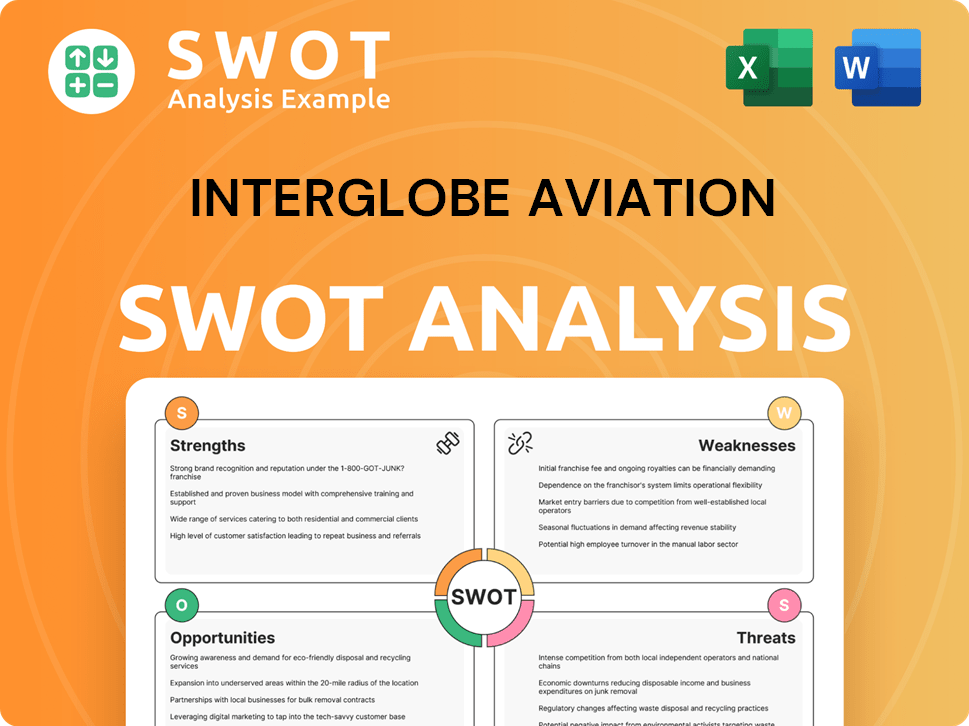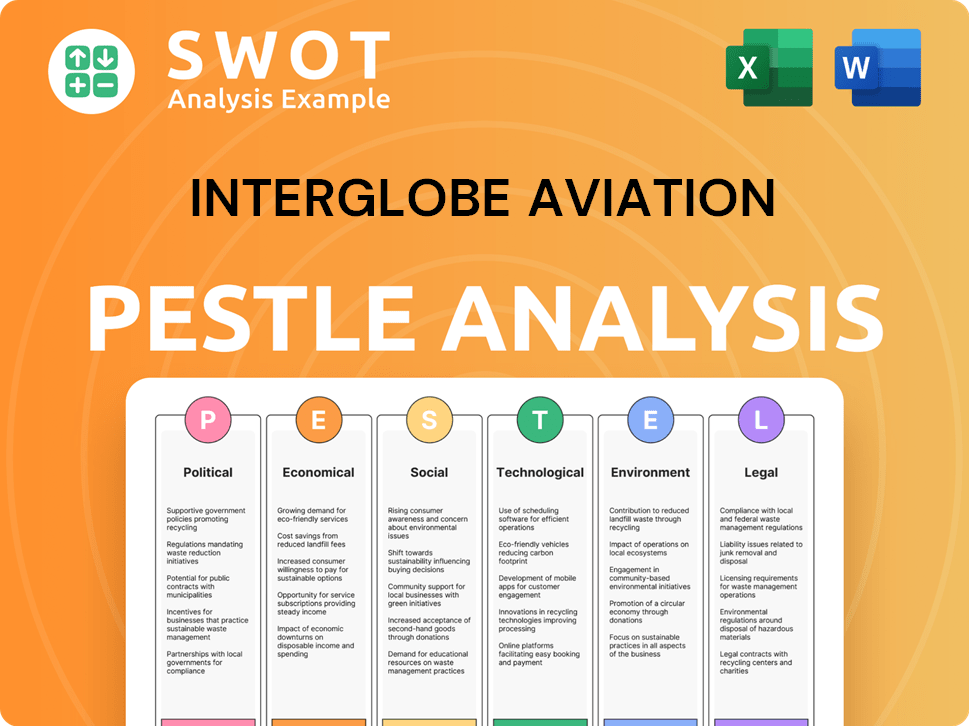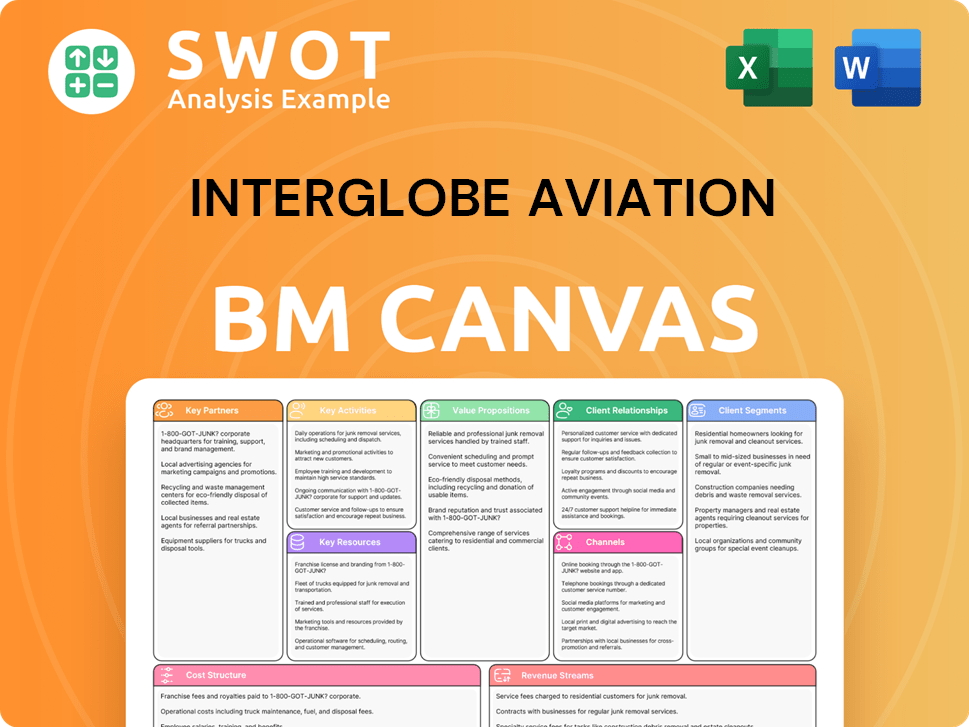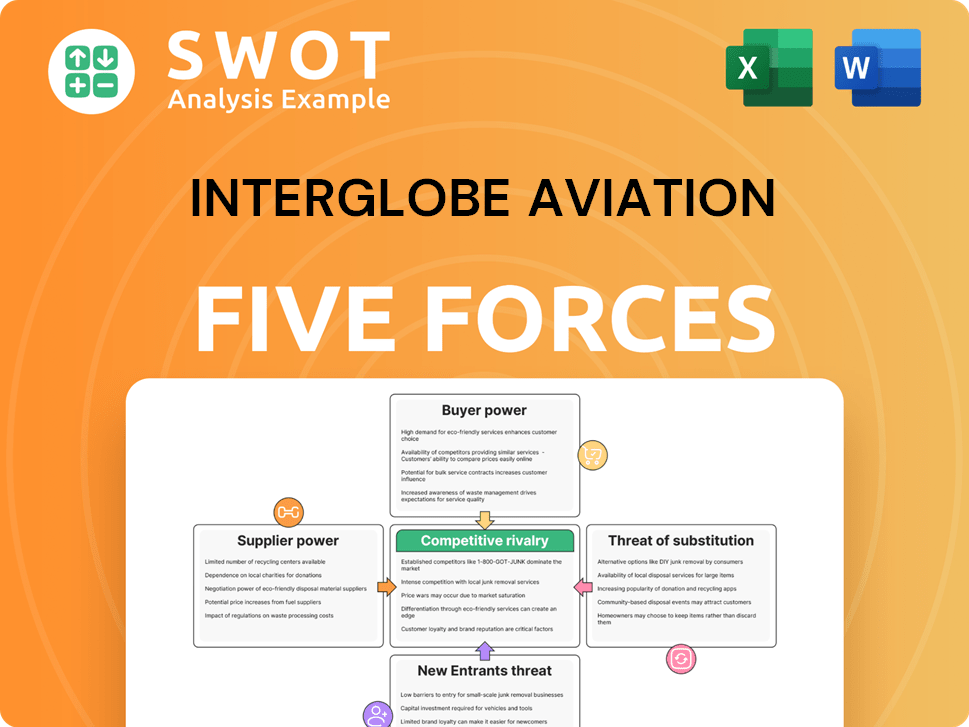InterGlobe Aviation Bundle
What Drives IndiGo's Success? Unveiling Its Mission, Vision, and Values
Understanding a company's core principles is key to grasping its strategic direction. This is especially true for aviation giants like InterGlobe Aviation (IndiGo), a leader in the Indian market. Delving into its mission, vision, and core values provides a comprehensive view of its operational strategies and future aspirations.

InterGlobe Aviation's success story is deeply intertwined with its foundational principles. To truly understand the airline's market position and future potential, it's essential to examine its guiding philosophies. Explore InterGlobe Aviation SWOT Analysis to gain further insights into its strategic landscape, complementing our exploration of IndiGo's mission, vision, and core values.
Key Takeaways
- IndiGo's mission, vision, and values are fundamental to its market dominance.
- Affordable travel, global leadership aspirations, and core values drive IndiGo's success.
- Integrity, customer focus, and future-thinking are key to IndiGo's culture.
- Alignment with principles is crucial for navigating industry challenges.
- A strong corporate purpose fosters market leadership and financial success.
Mission: What is InterGlobe Aviation Mission Statement?
IndiGo's mission is to "boost economic growth and social cohesion in India by providing air connectivity and affordable air fares across our country and to international destinations, thereby promoting trade, tourism and mobility. Your Company will build the best air transportation system in the world."
Let's delve into the core of InterGlobe Aviation's (IndiGo) mission statement and analyze its significance.
IndiGo's mission statement explicitly targets individuals seeking affordable air travel. This customer-centric approach is central to its business model. The airline’s commitment to low fares is a primary driver for its success in the competitive aviation market.
The core offering is air transportation. IndiGo focuses on providing a reliable and efficient service. This includes a network of domestic and international routes designed to facilitate connectivity and convenience for passengers.
While initially focused on the domestic Indian market, IndiGo's mission extends to international destinations. This expansion is crucial for promoting trade and tourism, aligning with its broader goals. IndiGo has significantly increased its international operations, with international passenger traffic growing substantially.
IndiGo differentiates itself by offering affordable fares, maintaining punctuality, and ensuring a hassle-free travel experience. These elements are critical to customer satisfaction and loyalty. In September 2023, IndiGo's on-time performance (OTP) was approximately 87%, showcasing its dedication to reliability.
The mission statement is reflected in IndiGo's operational strategies. The airline’s low-cost carrier model emphasizes efficiency and cost control. This includes using a single aircraft type (Airbus A320 family) to streamline operations, maintenance, and training, ultimately contributing to lower fares.
The mission is inherently customer-centric, prioritizing affordable fares and a seamless travel experience. IndiGo's success hinges on its ability to consistently meet customer expectations in terms of price, punctuality, and service quality. This focus has helped IndiGo maintain a high market share in the Indian aviation sector.
IndiGo's mission statement guides its strategic decisions and operational practices. The company's commitment to affordability, punctuality, and customer satisfaction has enabled it to become a leading player in the Indian aviation market. Understanding the mission of InterGlobe Aviation is crucial for investors and stakeholders looking to assess its long-term prospects. For a deeper understanding of the competitive landscape, consider exploring the Competitors Landscape of InterGlobe Aviation.
InterGlobe Aviation SWOT Analysis
- Complete SWOT Breakdown
- Fully Customizable
- Editable in Excel & Word
- Professional Formatting
- Investor-Ready Format

Vision: What is InterGlobe Aviation Vision Statement?
IndiGo's vision is 'to become the most superior and admired airline in the world.'
Let's delve into the ambitious vision of InterGlobe Aviation, the parent company of IndiGo. This vision statement is a powerful declaration of intent, setting a clear direction for the future of the airline. Understanding this vision is crucial for anyone seeking to understand the company's long-term goals and strategic direction.
The IndiGo Vision is explicitly future-focused. It's not about the present; it's about where the company aspires to be. This forward-looking approach is key to driving innovation and long-term growth within the Aviation Company.
The scope of the IndiGo Vision extends beyond mere market dominance. It aims for global leadership, striving to be the "most superior and admired" airline worldwide. This implies a commitment to excellence in all aspects of the business.
Considering InterGlobe Aviation's current position, the vision is both aspirational and increasingly realistic. IndiGo has a strong foundation in the Indian market, holding a 64.3% market share as of March 2025.
IndiGo's success hinges on operational excellence. This includes factors like on-time performance, cost efficiency, and customer service. These elements are crucial for achieving the vision of becoming the "most superior and admired" airline. The company's focus on these areas provides a credible path toward its long-term goals.
The vision serves as a powerful motivator for employees, inspiring them to strive for excellence. It also guides strategic decisions, ensuring that all actions align with the goal of global recognition and operational excellence. This is further explored in the Marketing Strategy of InterGlobe Aviation.
As of April 2025, IndiGo is the world's most valuable airline by market capitalization, valued at $23.4 billion. This financial strength provides a solid base for future expansion and achieving its ambitious vision. Continuous expansion into international routes is also a key component.
In summary, the IndiGo Vision is a bold statement that reflects the company's ambition to become a global leader in the airline industry. This vision, coupled with a strong foundation and strategic focus, sets the stage for IndiGo's continued growth and success.
InterGlobe Aviation PESTLE Analysis
- Covers All 6 PESTLE Categories
- No Research Needed – Save Hours of Work
- Built by Experts, Trusted by Consultants
- Instant Download, Ready to Use
- 100% Editable, Fully Customizable

Values: What is InterGlobe Aviation Core Values Statement?
InterGlobe Aviation, operating primarily as IndiGo, is a leading aviation company in India, and its success is significantly shaped by its core values. These values guide the company's operations, influence its culture, and help it maintain its competitive edge in the dynamic aviation market.
Integrity is a cornerstone of InterGlobe Aviation's operations, emphasizing financial and intellectual honesty. This value ensures transparent business practices, ethical decision-making, and accountability at all levels. It builds trust with customers, partners, and employees, which is crucial in the competitive aviation industry. For example, IndiGo's commitment to transparent pricing, being upfront about ancillary charges, reflects its dedication to integrity, which has helped build a strong reputation.
Customer orientation is central to IndiGo's strategy, focusing on understanding and meeting customer needs. This is evident in its commitment to providing a hassle-free experience, on-time performance, and efficient customer service. IndiGo's focus on customer satisfaction has contributed to its high load factors, often exceeding industry averages, demonstrating the effectiveness of this value. This is a key differentiator for the Aviation Company.
Future mindedness drives InterGlobe Aviation's continuous improvement and innovation. This value is reflected in its adoption of new technologies, investment in fuel-efficient aircraft, and exploration of sustainable aviation practices. IndiGo's proactive approach to incorporating new technologies and sustainable practices helps it stay competitive and adapt to the evolving aviation landscape. For example, the airline has been exploring sustainable aviation fuel (SAF) to reduce its carbon footprint, demonstrating its commitment to a sustainable future.
Safety is a non-negotiable priority for InterGlobe Aviation, ensuring the well-being of passengers and crew. This value is paramount in all aspects of its operations, from maintenance to pilot training. IndiGo's commitment to safety is reflected in its rigorous safety protocols and its investment in advanced safety technologies. This value is crucial for maintaining public trust and ensuring the long-term sustainability of the airline. The company's focus on safety is a key component of its operational excellence and is fundamental to its success as an InterGlobe Aviation.
These core values of IndiGo Core Values collectively contribute to InterGlobe Aviation's unique corporate identity, emphasizing safety, efficiency, customer satisfaction, and a forward-thinking approach. Understanding these values provides valuable insights into the company's operations and its strategic direction. To further understand how these values translate into tangible business practices, consider exploring the Revenue Streams & Business Model of InterGlobe Aviation. The next chapter will delve into how the IndiGo Mission and IndiGo Vision influence the company's strategic decisions.
How Mission & Vision Influence InterGlobe Aviation Business?
The mission and vision of InterGlobe Aviation, the parent company of IndiGo, are fundamental to its strategic direction. These guiding principles shape its business model, influencing everything from operational efficiency to expansion plans.
IndiGo's mission, centered on providing affordable air travel, directly impacts its strategic decisions, particularly its cost-focused approach. This commitment is evident in several key areas:
- Fleet Management: The airline’s consistent use of a single aircraft type (Airbus A320 family) streamlines maintenance, training, and operations, reducing costs.
- Operational Efficiency: Quick turnaround times and high aircraft utilization are critical to maintaining affordability, ensuring more flights per aircraft.
- Route Planning: Strategic route selection and network expansion are driven by the mission to connect more people, focusing on high-demand routes.
- Cost Control: Rigorous cost management across all departments is a constant priority to deliver low fares.
The vision of becoming a superior and admired global airline pushes IndiGo towards initiatives that enhance its brand and customer experience.
This vision drives strategic initiatives such as expanding international routes and enhancing the customer experience. The launch of 'IndiGoStretch' on select routes, a business class offering, is an example of adapting to market trends while maintaining a focus on cost efficiency.
Large orders for Airbus A320 family aircraft support expansion and maintain a young, fuel-efficient fleet. Entry into new domestic and international destinations is a direct result of their mission to provide wider connectivity.
The dominant domestic market share, reaching 64.3% in March 2025, and consistent profitability, with a net profit of ₹3,067.5 crore in Q4 FY25, are key indicators of success. These figures demonstrate effective execution of their cost-effective strategy and ability to attract a large passenger base.
The mission and vision shape day-to-day operations by emphasizing punctuality, efficiency, and courteous service. Long-term planning is influenced by the vision of global leadership, guiding decisions on fleet expansion, network development, and investments in technology and training.
While specific quotes from leadership directly linking decisions to mission/vision were not readily available, the consistent emphasis on low fares, on-time performance, and customer satisfaction across various reports and statements reflects leadership's commitment to these guiding principles. The company's strategic focus is also reflected in its understanding of its target market.
In essence, the mission and vision of InterGlobe Aviation are not just statements; they are the driving forces behind its strategic decisions and operational excellence. These principles guide the airline’s actions, from fleet management to customer service, ensuring a consistent focus on affordability, efficiency, and growth. Ready to explore how the company can improve these core values? Let's move on to the next chapter: Core Improvements to Company's Mission and Vision.
InterGlobe Aviation Business Model Canvas
- Complete 9-Block Business Model Canvas
- Effortlessly Communicate Your Business Strategy
- Investor-Ready BMC Format
- 100% Editable and Customizable
- Clear and Structured Layout

What Are Mission & Vision Improvements?
While InterGlobe Aviation's current mission and vision have served as a foundation for its success, there are opportunities to refine them for continued growth and relevance in the dynamic aviation industry. These improvements aim to better reflect current market demands and position the airline for long-term success.
Incorporating a commitment to sustainability within the IndiGo Mission or IndiGo Vision would be a significant step. This could involve specific goals for reducing carbon emissions, investing in sustainable aviation fuels (SAF), and adopting eco-friendly practices across its operations. In 2024, the aviation industry is under increasing pressure to reduce its environmental footprint, and a clear statement on sustainability would resonate with environmentally conscious travelers and investors. For example, the International Air Transport Association (IATA) has set a goal for the aviation industry to achieve net-zero carbon emissions by 2050.
The IndiGo Vision could benefit from explicitly mentioning a commitment to leveraging technology. This would showcase the airline's dedication to digital transformation, enhancing customer experience, and improving operational efficiency. This could include investments in areas like AI-powered customer service, data analytics for route optimization, and the adoption of advanced aircraft technologies. Consider the fact that, according to a 2024 report by McKinsey, airlines that embrace digital transformation see a 10-15% increase in operational efficiency.
As InterGlobe Aviation, the parent company of IndiGo, expands its international network and introduces services like 'IndiGoStretch,' refining the vision is crucial. Instead of simply aiming to be the 'most superior and admired airline in the world,' a vision that emphasizes being the most preferred airline for value and reliability across its network, acknowledging its low-cost roots while aspiring for excellence in service, could be more precise. This shift aligns with the airline's business model and its focus on providing affordable and reliable air travel. A deeper dive into the Growth Strategy of InterGlobe Aviation can provide further insights.
While the IndiGo Core Values are important, they could be strengthened by being more explicitly defined and communicated. This could involve clarifying how these values translate into specific actions, such as employee training programs, customer service protocols, and corporate social responsibility initiatives. A clear articulation of Company Values helps to foster a strong company culture and guide employee behavior, which is essential for providing consistent service and maintaining a positive brand image. For example, a 2024 study by Deloitte revealed that companies with clearly defined and communicated values experience 20% higher employee engagement.
How Does InterGlobe Aviation Implement Corporate Strategy?
The true measure of a company's mission, vision, and core values lies in their practical application. This chapter explores how InterGlobe Aviation, operating as IndiGo, translates its guiding principles into tangible business practices and strategic decisions.
IndiGo's commitment to its mission of providing affordable fares is directly implemented through its fleet strategy. This is a key aspect of the Brief History of InterGlobe Aviation.
- Fuel-Efficient Fleet: The airline's primary reliance on the Airbus A320 family, known for its fuel efficiency, directly reduces operational costs. The A320neo family, in particular, offers significant fuel savings compared to older models.
- Cost Management: By keeping operational costs low, IndiGo can offer competitive fares, supporting its mission to make air travel accessible.
- Technological Advancement: Investing in a modern fleet also aligns with a future-oriented approach, ensuring the airline remains competitive.
IndiGo's extensive route network expansion is a clear implementation of its mission to provide air connectivity. This expansion strategy is a cornerstone of InterGlobe Aviation's business strategy.
Leadership plays a crucial role in reinforcing the mission and vision. CEO Pieter Elbers regularly communicates the airline's strong financial performance.
IndiGo's actions reflect its core values, such as punctuality and customer orientation. This is evident in its on-time performance and customer service initiatives.
The establishment of iFly, IndiGo's learning academy, demonstrates an investment in reinforcing values like customer orientation and maintaining a skilled workforce. This is a key element of IndiGo's company culture and values.
InterGlobe Aviation Porter's Five Forces Analysis
- Covers All 5 Competitive Forces in Detail
- Structured for Consultants, Students, and Founders
- 100% Editable in Microsoft Word & Excel
- Instant Digital Download – Use Immediately
- Compatible with Mac & PC – Fully Unlocked

Related Blogs
- What are Mission Vision & Core Values of InterGlobe Aviation Company?
- What is Competitive Landscape of InterGlobe Aviation Company?
- What is Growth Strategy and Future Prospects of InterGlobe Aviation Company?
- How Does InterGlobe Aviation Company Work?
- What is Sales and Marketing Strategy of InterGlobe Aviation Company?
- Who Owns InterGlobe Aviation Company?
- What is Customer Demographics and Target Market of InterGlobe Aviation Company?
Disclaimer
All information, articles, and product details provided on this website are for general informational and educational purposes only. We do not claim any ownership over, nor do we intend to infringe upon, any trademarks, copyrights, logos, brand names, or other intellectual property mentioned or depicted on this site. Such intellectual property remains the property of its respective owners, and any references here are made solely for identification or informational purposes, without implying any affiliation, endorsement, or partnership.
We make no representations or warranties, express or implied, regarding the accuracy, completeness, or suitability of any content or products presented. Nothing on this website should be construed as legal, tax, investment, financial, medical, or other professional advice. In addition, no part of this site—including articles or product references—constitutes a solicitation, recommendation, endorsement, advertisement, or offer to buy or sell any securities, franchises, or other financial instruments, particularly in jurisdictions where such activity would be unlawful.
All content is of a general nature and may not address the specific circumstances of any individual or entity. It is not a substitute for professional advice or services. Any actions you take based on the information provided here are strictly at your own risk. You accept full responsibility for any decisions or outcomes arising from your use of this website and agree to release us from any liability in connection with your use of, or reliance upon, the content or products found herein.